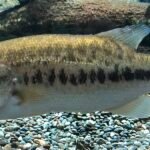Vienna, Austria.- The IAEA is launching a new 4-year Coordinated Research Project (CRP) starting in 2019 to advance understanding on the effects of ocean acidification on seafood around the world and to explore adaptation strategies for aquaculture and seafood industries.
Intensive fossil-fuel burning and deforestation over the last two centuries has increased atmospheric carbon dioxide by 50 % above pre-industrial values. The global ocean currently absorbs roughly one third of this anthropogenic carbon dioxide, and its carbonate chemistry is fundamentally altered in the process. By doing so, the ocean undergoes a decrease in pH, referred to as ocean acidification.
Ocean acidification has been recognized as a major threat to marine ecosystems. Concern about the impacts of ocean acidification on socioeconomically important seafood is increasing world-wide, and ocean acidification is now an integral part of the United Nations 2030 Agenda for Sustainable Development. Furthermore, recent studies have demonstrated that ocean acidification may also impact the quality of seafood, and there is a growing body of literature documenting the biological response of seafood to ocean acidification. Long-term studies are essential to track the effects of ocean acidification, but there are few of these studies. Furthermore, data on economically and socially important seafood in developing countries are still largely lacking.
Therefore, this CRP will apply a common experimental approach to assess the long-term impacts of ocean acidification on key seafood species (e.g., oysters, mussels, shrimps, lobsters and/or fish) around the globe. Impacts will be assessed using both conventional and nuclear and isotopic techniques.
Nuclear and isotopic techniques are key tools to study the effects of ocean acidification on marine organisms. They can be used to measure parameters such as calcification rates, metabolomics, co-contamination, etc.
The data collected will lay the basis for the development and implementation of adaptive solutions.
CRP overall objective:
The primary goal of this CRP is to advance understanding about the quantitative and qualitative effects of ocean acidification on key seafood species around the world and to explore adaptation strategies for aquaculture and food industries, using a standardized, collaborative approach.
Stay Always Informed
Join our communities to instantly receive the most important news, reports, and analysis from the aquaculture industry.
Specific research objectives:
– Collect and compare worldwide data on the impacts of ocean acidification on key local seafood species through a collaborative approach involving Member States from across the globe.
– Expand international collaboration on ocean acidification using knowledge and research kits developed through the Ocean Acidification International Coordination Centre (OA-ICC) capacity building activity and the TC INT7019 project.
– Explore innovative approaches to study the effects of ocean acidification on seafood security, including novel ways of applying nuclear and isotopic techniques to this field of study.
How to join the CRP:
For further information related to this CRP, potential applicants should write to the Research Contracts Administration Contact Point: Research.Contracts@iaea.org
Source: International Atomic Energy Agency (IAEA)
Editor at the digital magazine AquaHoy. He holds a degree in Aquaculture Biology from the National University of Santa (UNS) and a Master’s degree in Science and Innovation Management from the Polytechnic University of Valencia, with postgraduate diplomas in Business Innovation and Innovation Management. He possesses extensive experience in the aquaculture and fisheries sector, having led the Fisheries Innovation Unit of the National Program for Innovation in Fisheries and Aquaculture (PNIPA). He has served as a senior consultant in technology watch, an innovation project formulator and advisor, and a lecturer at UNS. He is a member of the Peruvian College of Biologists and was recognized by the World Aquaculture Society (WAS) in 2016 for his contribution to aquaculture.







